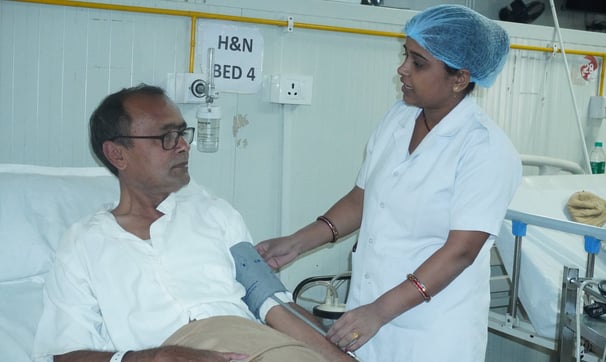Mental Health Care
AFTER SURGERY


Caring for a loved one with cancer can be emotionally and mentally challenging. It's important for caregivers to prioritize their own mental health and well-being while supporting their loved one.
Mental Health Advice and Strategies for Cancer Caregivers
1. Seek Support:
Don’t try to manage everything on your own. Reach out to friends, family members, and support groups for emotional support.
Consider joining a caregiver support group where you can connect with others who are going through similar experiences. Sharing your feelings and experiences can be incredibly comforting.
2. Set Realistic Expectations:
Understand that caregiving can be physically and emotionally draining. Set realistic expectations for both yourself and your loved one’s recovery.
Accept that it’s okay to ask for help and delegate tasks. You can’t do everything alone.
3. Take Care of Your Physical Health:
Ensure you get enough sleep, eat balanced meals, and engage in regular physical activity. Taking care of your physical health positively impacts your mental well-being.
Don’t neglect your own healthcare needs. Continue attending your medical appointments and prioritize preventive care.
4. Manage Stress:
Practice stress-reduction techniques such as deep breathing, meditation, yoga, or mindfulness exercises.
Identify sources of stress and develop problem-solving strategies to address them.
5. Set Boundaries:
Set boundaries to avoid burnout. Understand your limitations and communicate them to your loved one and family members.
It’s okay to say "no" to additional responsibilities when you feel overwhelmed.
6. Educate Yourself:
Learn about your loved one’s cancer diagnosis and treatment options. Knowledge can reduce anxiety and uncertainty.
Stay informed about your loved one’s care plan and ask questions when needed.
7. Communicate Openly:
Maintain open and honest communication with your loved one. Discuss their wishes, concerns, and feelings.
Encourage them to express their thoughts and emotions, and validate their feelings.
8. Take Breaks:
Don’t feel guilty about taking breaks. Even short breaks can help you recharge and return to caregiving with a clearer mind.
Consider respite care options to give yourself temporary relief from caregiving duties.
9. Seek Professional Help:
If caregiving significantly impacts your mental health, speak to a therapist or counselor specializing in caregiver support.
Therapy can provide a safe space to explore your emotions and develop coping strategies.
10. Celebrate Small Victories:
Recognize and celebrate milestones and moments of joy in your caregiving journey. These small victories can provide emotional nourishment.
11. Practice Self-Compassion:
Be kind and forgiving to yourself. Understand that you don’t have to be perfect—doing your best is enough in such a challenging situation.
Final Thoughts:
Caring for a loved one with cancer is a marathon, not a sprint. Prioritizing your mental health and well-being is essential, not selfish. Remember that your care makes a significant difference in your loved one’s life. Don’t hesitate to seek help and support when needed, and always take time for yourself.


